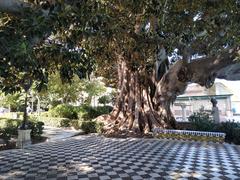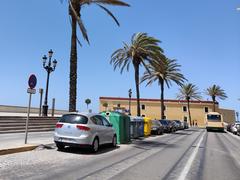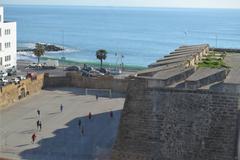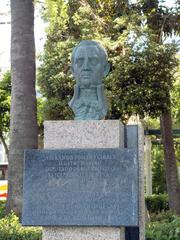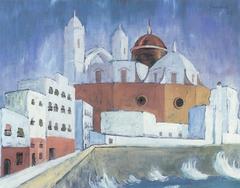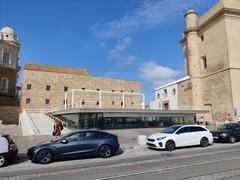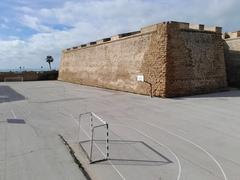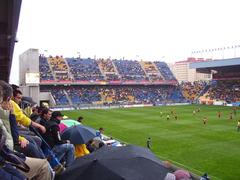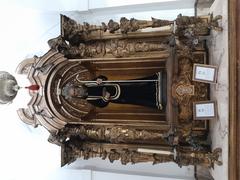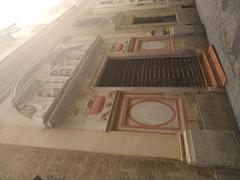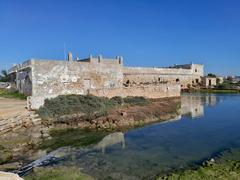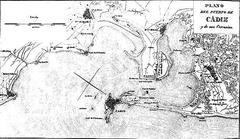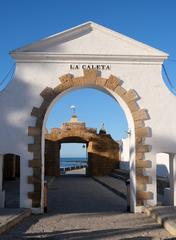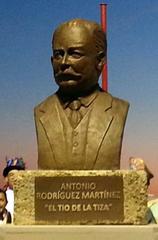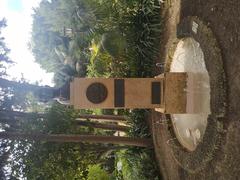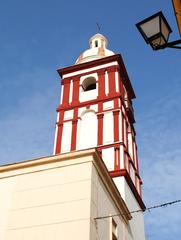Casa de los Cinco Gremios Cádiz, Spain: Visiting Hours, Tickets, and Historical Sites Guide
Date: 14/06/2025
Introduction
Nestled in the heart of Cádiz’s historic center, the Casa de los Cinco Gremios is a remarkable testament to the city’s mercantile golden age. Built in the late 18th century as the headquarters for five of Spain’s most powerful trade guilds, this neoclassical palace is both architecturally impressive and deeply intertwined with Cádiz’s social and economic history. Today, the building is home to the University of Cádiz’s Rectorate and, although not open for daily public visits, remains a must-see site for those interested in Andalusian heritage, urban architecture, and the legacy of transatlantic commerce.
This detailed guide covers everything you need to know about the Casa de los Cinco Gremios—including its history, architectural features, cultural role, visiting information, accessibility, guided tour options, and tips for exploring the surrounding area. Whether you are a traveler, student, or heritage enthusiast, this resource will help you make the most of your Cádiz experience.
For official resources and updates, consult the Cádiz tourism portal (Casa De Los Cinco Gremios Guide) and local news coverage (Diario de Cádiz).
Table of Contents
- Introduction
- Historical Overview
- Visiting Casa de los Cinco Gremios
- Tips for a Memorable Visit
- Frequently Asked Questions (FAQ)
- Preservation and Community Engagement
- Conclusion
- References and Further Reading
Historical Overview
Origins and Construction
The Casa de los Cinco Gremios was completed in 1788 at the height of Cádiz’s prosperity as a gateway for Spanish-American trade. It served as the Cádiz branch of the influential Compañía de los Cinco Gremios Mayores de Madrid, an alliance of jewelers, haberdashers, silk merchants, drapers, and linen merchants. The guilds coordinated trade, set commercial standards, and played a vital role in the city’s economic and civic life (Wikipedia: Cinco Gremios Mayores).
Role in Cádiz’s Economic Boom
During the 18th century, Cádiz became Spain’s principal port for New World commerce. The Casa de los Cinco Gremios was a bustling hub for merchants, financiers, and civic leaders, hosting meetings, auctions, and celebrations. The guilds were instrumental in developing local industry, training artisans, and mediating between the city council and the Crown (Diario de Cádiz).
Architectural Features and Symbolism
The palace’s neoclassical façade on Calle Ancha features symmetrical pilasters, restrained decorative motifs, and a stately stone entrance. Inside, a central courtyard with arcaded galleries and decorative columns showcases a blend of Andalusian, Moorish, and Renaissance influences. The building is further distinguished by original elements such as a grand staircase, high-ceilinged rooms, and emblematic symbols representing the five guilds (Guía de Cádiz).
Historical Transformations
Throughout its history, the Casa has adapted to various roles. During the Peninsular War (1808–1814), it served as a provisional residence for General Castaños. After the bankruptcy of the guild company, it became home to notable businesses like the “Relojería Alemana” and later housed provincial government offices. Since 1985, it has been the Rectorate of the University of Cádiz (Soy del Doce).
Cultural Significance
Recognized as a Bien de Interés Cultural (Asset of Cultural Interest), the Casa de los Cinco Gremios stands as a symbol of Cádiz’s communal spirit and merchant legacy. It is featured in local festivals, heritage tours, and educational programs, and its restoration set a benchmark for conservation in the city (Diario de Cádiz).
Visiting Casa de los Cinco Gremios
Location and Access
The Casa de los Cinco Gremios is located at Calle Ancha 16, right in Cádiz’s historic center. The pedestrian-friendly street is surrounded by cafés, boutiques, and other notable historical buildings, making it an ideal starting point for a walking tour of the city (Guía de Cádiz). Public transport and taxis provide easy access, while parking in the old town is limited.
Visiting Hours
The building does not maintain regular public visiting hours due to its function as a university rectorate. Access is generally available during special events, guided tours, and open days organized by the University of Cádiz or local heritage groups. For the latest information, check the University of Cádiz website or contact local tourist offices.
Tickets and Admission
No regular ticketing is required for exterior viewing or courtyard access. Admission to special tours or events is typically free or subject to a nominal fee. Bookings for guided tours should be made in advance, as spaces are limited (Casa De Los Cinco Gremios Guide).
Accessibility
The exterior is accessible from the pedestrianized Calle Ancha and suitable for wheelchairs and strollers. Interior access is limited and may not be fully wheelchair accessible due to the building’s historic layout. Contact the university or event organizers ahead for accessibility arrangements.
Guided Tours and Visitor Experience
Although dedicated guided tours are rare, the Casa de los Cinco Gremios is often included in walking tours of Cádiz’s historic center. These highlight the building’s history, architecture, and role in the city’s development. During special events, visitors may access the central courtyard, grand staircase, and historical rooms featuring interpretive exhibits on Cádiz’s mercantile past (Visiting Cádiz). Photography is allowed in exterior spaces and often in the courtyard, but restrictions may apply indoors.
Nearby Attractions
Combine your visit with these nearby sites:
- Cádiz Cathedral: A blend of baroque and neoclassical architecture.
- Torre Tavira: The city’s highest watchtower, with panoramic views.
- Museo de Cádiz: Home to archaeological and fine arts collections.
- Plaza de las Flores: Known for its vibrant flower stalls and tapas bars.
- Parque Genovés: A lush botanical park ideal for a relaxing stroll.
Tips for a Memorable Visit
- Plan ahead and check schedules for tours or public events.
- Include the Casa as part of a larger city tour, visiting other landmarks along Calle Ancha.
- Enjoy the local café culture and sample Andalusian cuisine nearby.
- Respect the building’s institutional use and posted guidelines during your visit.
Frequently Asked Questions (FAQ)
Q: Are there regular visiting hours?
A: No, the building is not open for daily public visits. Access is possible during special events and guided tours. Check University of Cádiz or Cádiz tourism resources for updates.
Q: Is there an entrance fee?
A: No regular fee. Admission for special events or tours is often free or modestly priced.
Q: Are guided tours available?
A: Yes, but they are not frequent. Guided tours are organized during festivals or heritage days and can be booked in advance.
Q: Is the Casa de los Cinco Gremios accessible?
A: The exterior and courtyard are accessible, but interior access may be restricted for those with mobility issues. Contact organizers for specific accommodations.
Q: Can you take photographs?
A: Yes, photography is permitted outside and typically in the courtyard. Restrictions may apply during events or in interior spaces.
Preservation and Community Engagement
Ongoing restoration and adaptive reuse by the University of Cádiz ensure that the Casa de los Cinco Gremios remains a vibrant part of Cádiz’s urban landscape. The site serves as a model for heritage conservation and community engagement, hosting educational programs and cultural events that foster local pride (Diario de Cádiz).
Conclusion
The Casa de los Cinco Gremios encapsulates the story of Cádiz’s mercantile ascendancy and its enduring legacy as a crossroads of cultures and commerce. While public access is generally limited, visiting during special events, guided tours, or simply appreciating its neoclassical façade along Calle Ancha allows you to connect with the city’s rich history. Complement your visit with nearby attractions, and immerse yourself in the vibrant life of Cádiz’s historic center.
For up-to-date visiting information, event schedules, and digital guides, download the Audiala app and follow Cádiz’s official tourism channels. Explore more of Cádiz’s historic sites to enrich your Andalusian adventure.
References and Further Reading
- Casa De Los Cinco Gremios Guide
- Diario de Cádiz: Casa de los Cinco Gremios
- Guía de Cádiz: Calle Ancha
- University of Cádiz Official Website
- Visiting Cádiz Guide
- Soy del Doce: Casa de los Cinco Gremios
- Wikimedia Commons: 18th-century buildings in Cádiz
- Mapcarta: Casa de los Cinco Gremios
- La Azotea de Cádiz: Calle Ancha History
- Petite Suitcase: Things to Do in Cádiz
- Anywhere We Roam: Things to Do Cádiz
- Wanderlust Chloe: Cádiz Travel Guide
